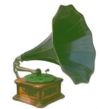He
studied at the Royal Manchester College of Music under John Acton (singing) and
Walter Carroll (theory). He wed the singer Edith Clegg in 1912 and went to
London, where the conductor Henry J. Wood heard him and planned to involve him
in the 1914 Norwich Festival. Unfortunately, the festival was interrupted by
the outbreak of World War One. However, Allin did sing the Handel aria "O
ruddier than the cherry", from Acis and Galatea, at a Promenade Concert
for Henry Wood during the war. (He was not called up for military service owing
to the fact he was classified in a low medical grade.) Sir Thomas Beecham
auditioned him and at once offered him the title role in Mussorgsky's Boris
Godunov, but Allin felt a less challenging debut was needed. So, his first
appearance for Beecham was as the Old Hebrew in Samson et Dalila on 15 October
1916. With the Beecham Opera Company he appeared, too, in Verdi's Aida. He
first sang at a Royal Philharmonic concert, again under Beecham's baton, in
1918. He later appeared as Boris, as Gurnemanz in Wagner's Parsifal, Hagen in
Wagner's Götterdämmerung and Baron Ochs in Richard Strauss' Der Rosenkavalier
at the Royal Opera House, Covent Garden. In 1921, he became founder-member of
the British National Opera Company. Allin created the role of Sir John Falstaff
in Holst's 1925 opera At the Boar's Head. In 1934, he appeared in the initial
Glyndebourne Festival production under Fritz Busch and Carl Ebert of Mozart's
Le Nozze di Figaro. Henry Wood later wrote (in 1938) that had Allin not
possessed such a retiring disposition, he might have become one of the world's
most celebrated operatic basses, and that even so, his stage roles numbered
almost 50. During the Second World War (1939-1945), he was a member of the Carl
Rosa Opera Company. This company gave London seasons, during which Allin
appeared alongside fellow singers Joan Hammond, Gwen Catley, Heddle Nash,
Dennis Noble, Parry Jones and Tudor Davies. Allin's career was not restricted
to opera, however, and he was perhaps best known to contemporary music-goers as
a concert recitalist and an oratorio singer. He appeared before the Royal
Philharmonic Society in a Royal Choral Society Beethoven Missa Solemnis in 1927
under Sir Hugh Allen. In 1932, after giving his 270th performance of Handel's
Messiah, at a Halle concert, he decided not to sing the part again. He always
gave the greatest satisfaction when he sang in music festivals, and Wood felt
that he could trust him with anything. He was one of the soloists in the
original line-up for Vaughan Williams's Serenade to Music on 5 October 1938.
Allin's line goes down to low D; the words set for his solo are 'The motions of
his spirit are dull as night, And his affections dark as Erebus.' He was also
in the performance of it for the Royal Philharmonic Society, on behalf of the
Musicians' Benevolent Fund, in February 1940. In 1934 he took part in a
seven-month operatic tour in Australia, appearing mainly in Melbourne and
Sydney. On his return he was offered a professorship of singing at the Royal
Academy of Music, and took it up in autumn 1935. Later he also accepted a
similar appointment at the Royal Manchester College, which he held jointly with
the other, only resigning the Manchester post in 1942 owing to pressure of work
in London. Among Allin's pupils were Jean Allister, Pamela Bowden, Richard
Lewis, Norman Lumsden and Ian Wallace (who followed his teacher into the role
of Bartolo at Glyndebourne). Allin's voice possessed a depth, authority and
resonance rare in modern-day British basses, the preferred style of voice now
being lighter and less magisterial. His singing technique was exemplary and his
vocal production was smooth and extremely attractive in tone, as his recordings
verify.
Chronology of some appearances
1916 Beecham Opera Company
1922-1929 British National Opera Company
1939-1945 Carl Rosa Opera Company
RECORDINGS FOR SALE


















